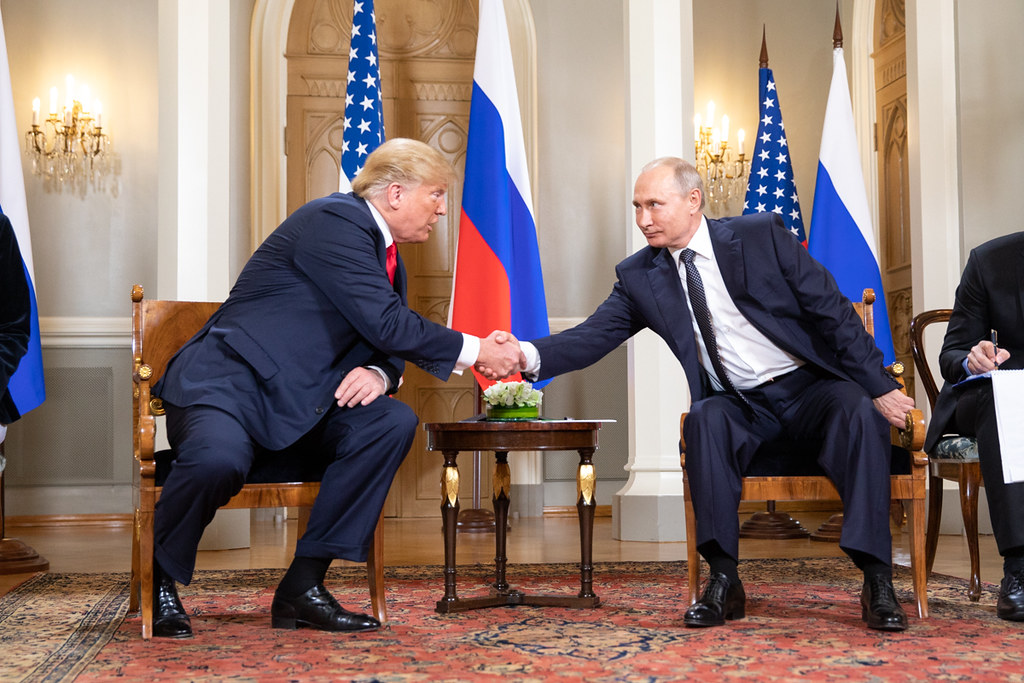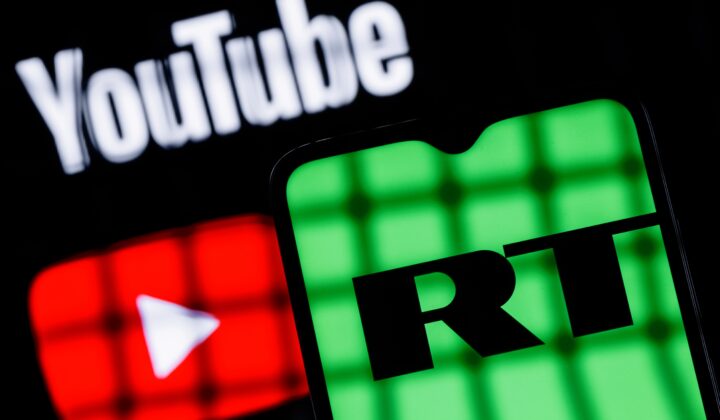A closer look at Russian influence on the American Right

The killing of Russian dissident Alexei Navalny coinciding with Tucker Carlson’s PR tour of Russia cast an awkward spotlight on Carlson and threw his fawning videos of Russian grocery stores and subway stations into stark relief. On his trip, Carlson praised Putin and even said, “Leadership requires killing people.”
Aside from giving Carlson a lesson on the pitfalls of giving airtime to Putin, the death of Navalny highlighted the divide in the Republican Party in its stance toward Russia. As former President Donald Trump praises Putin and pundits like Carlson release American-made Russian propaganda, it’s no question that they are having some effect on American society. The big questions are: How much of an effect? And who’s buying it? —Melissa Amour, Managing Editor

Russia and the Right
Tucker Carlson’s recent visit to Russia and his interview with Vladimir Putin have raised the question of whether the Republican Party—and the American Right more generally—has increasingly become a “party of Putin.” The accusations aren’t just coming from Democrats; they’re coming from inside the Republican Party. “We have to take seriously the extent to which you have now got a Putin wing of the Republican Party,” said former Republican Representative Liz Cheney.
Historically, the GOP took a hawkish approach to Russia. But those feelings softened after the fall of the Soviet Union brought an end to communist rule. Even Putin, the former KGB agent turned Russian dictator, was considered something of an ally by some figures on the Right and the Left as recently as 2012.
Since then, Russian interference in US elections, its belligerence toward its neighbors, and its treatment of opposition leaders has led both sides to unite against Russia, according to polls from YouGov and Gallup. So is it fair to suggest that the GOP is pro-Putin? Or is the reality more complex? Let’s take a look.
What You Should Know
Republicans are divided into three camps: those who actively or tacitly support Putin, those who condemn Putin, and those who would largely like to see the US step back from global affairs. Trump fits into the first category, frequently threatening the US’s NATO allies in the face of Russian expansionism and downplaying Putin’s ruthlessness. Speaking about NATO allies this month, Trump said:
“You didn’t pay? You’re delinquent? No, I would not protect you. In fact, I would encourage them to do whatever the hell they want.” —Donald Trump at South Carolina rally, February 10, 2024
There are mainstream Republicans who routinely condemn Putin and strongly support Ukraine in its brutal war with Russia, but who are forced to walk a delicate line in order to appease Trump.
“[It is] very, very important for the United States to stand strong and stand with Ukraine. … Donald Trump’s political rallies don’t really translate into Donald Trump’s actual policies. If you look at his policies, if you look at his record, he actually increased funding for NATO, increased the European Reassurance Initiative.” —Rep. Michael Turner of Ohio, chair of the House Intelligence Committee
And there are those with a more isolationist attitude, who are ambivalent to the ongoing war and solely focused on domestic concerns.
“We’re hearing from the president of Ukraine again, but we’ve yet to hear from our own president about the border, our border.” —Sen. Eric Schmitt of Missouri
With amplification from the right-wing media, pro-Putin messaging is playing to the populist, strongly pro-Trump base, but not in as large of numbers as it might seem.
“Even though only 19% of all respondents answered ‘Vladimir Putin’ when asked, ‘Overall, who do you think is a better president—Joe Biden or Vladimir Putin,’ 52% of self-identifying MAGA Republicans selected Vladimir Putin.” —Caylan Hays, Vanderbilt Unity Poll, April 7, 2023
How We Got Here
Americans’ views of Russia and Putin first began to sour in 2013, and got worse in 2014, when Russia invaded Crimea. Republicans at that time were strongly critical of then-President Barack Obama’s Russia policy, which they considered weak.
“[Russia] is without question our No. 1 geopolitical foe. They fight every cause for the world’s worst actor. The idea that [Obama] has more flexibility in mind for Russia is very, very troubling indeed.” —Republican presidential nominee Mitt Romney in 2012
“Russia is a gas station masquerading as a country. It’s kleptocracy, it’s corruption, it’s a nation that’s really only dependent upon oil and gas for their economy. No more reset buttons, no more ‘Tell Vladimir I’ll be more flexible.’” —Sen. John McCain of Arizona in 2014
Big changes came in 2016, during Trump’s first run for president. He freely complimented Putin’s leadership, made negative comments about NATO, and championed a more friendly relationship between the US and Russia. Trump even prevailed upon the GOP to alter its official platform on Ukraine. The upshot? Some of the Republican base developed more favorable opinions of Russia and Putin.
“A major reason for the overall rise in Putin’s favorable rating this year is Republicans’ more positive views of the Russian leader, from 12% in 2015 to 32% today.” —Art Swift of Gallup in February 2017
That trajectory was abruptly halted in 2022, with the Russian invasion of Ukraine. In December of that year, Republican members of Congress joined their Democratic counterparts to give a standing ovation to Ukrainian leader Volodymyr Zelensky. Republicans disliked Putin almost as much as Democrats.
Attitudes toward Russia remain very negative. Majorities of Americans have very unfavorable opinions of Russia (62%), say Russia is an enemy (64%), and have no confidence at all in Putin (71%). There are slight partisan differences on attitudes toward Putin, with Republicans marginally less negative than Democrats toward Russia’s leader. And Republicans are almost equally divided in their views toward NATO, Ukraine, and Zelensky. —Pew Research, May 10, 2023
So while the Trump wing of the Republican party took a softer position on Russia, everyday Republican voters did not necessarily go with them. According to a Pew Research survey released this month, a large majority (74 percent) of Americans still view the war as important to US national interests. Two years in, attitudes on the Right are cooling, but concerns about the costs of aiding Ukraine’s defense are typically cited as the reason, rather than overt support of Russia.
Americans’ views on the war [in Ukraine] have shifted, with a plurality now saying the U.S. is doing too much to help Ukraine. Forty-one percent of Americans overall say the U.S. is doing too much, which has risen from 24% in August 2022 and 29% in June 2023. … Both Republicans (62%) and independents (44%) increasingly see the U.S. as doing too much to support Ukraine compared with when Gallup began asking this question in August 2022. —Gallup, November 2, 2023
What People Are Saying
Though Tucker Carlson denies that he is pro-Putin, he had this to say in 2019:
“Why do I care what is going on in the conflict between Ukraine and Russia?! And I’m serious. Why do I care? Why shouldn’t I root for Russia? Which I am.” —Tucker Carlson
He’s not alone in those sentiments. On the extreme far right, there is some active support for Russia and Putin. Roughly 4 percent of Americans are rooting for Russia to be victorious in the war with Ukraine, according to YouGov polling. But that cohort remains extremely small, and Republican electeds are beginning to stand up to the Putin apologists among them.
“The Soviets had a term for people like Tucker: useful idiots.” —Sen. Thom Tillis of North Carolina
Though pro-Putin propaganda, such as that spread by Carlson, is having an impact, the far bigger influence on the Republican base, not surprisingly, is Trump. However, their opinions are less pro-Putin than NATO-skeptical.
“Republicans have moved away from the [NATO] alliance. A significant chunk of them also align with Trump’s comments about encouraging Russia to do ‘whatever the hell they want’ to NATO countries that don’t meet spending targets. Republican support for Ukraine joining NATO has moved from 50% in favor with 19% opposed in the YouGov polling in July to 36-30% today. Similarly, the Quinnipiac poll showed that the percentage of Republicans who label NATO ‘very important’ has dropped from 40% in April 2022 to 33% today. Nearly as many label it either ‘not so important’ (17%) or ‘not at all important’ (12%).” —Washington Post analyst Aaron Blake
The GOP is not a pro-Putin party, but voters are increasingly skeptical about the importance of defending Ukraine. Thankfully, opinions of the Russian autocrat remain overwhelmingly negative.
“Nearly all Republicans—regardless of their opinion of former President Trump—think Russian President Vladimir Putin is to blame for the war.” —Chicago Council on Global Affairs survey, January 29, 2024

- Trump, Putin, Carlson and the Shifting Sands of Today’s American Politics —The New York Times
- How You Can Tell Propaganda from Journalism: Let’s Look at Tucker Carlson’s Visit to Russia —The Conversation
- Former US Spies Warned in 2020 that the Hunter Biden Scandal Had Russian Fingerprints. They Feel Vindicated Now —NBC News
- Marking the Second Anniversary of the War in Ukraine —The Dispatch
- Older Americans See Greater Importance in Current Global Conflicts Than Younger Adults —Pew Research Center
- SCOTUS steps in: Supreme Court to Hear Trump’s Immunity Claim, With Arguments Set for April —The New York Times
- McConnell steps out: Mitch McConnell to Step Down as Republican Senate Leader in November —The Washington Post
- They’ve got a deal: Top Lawmakers Strike Funding Deal, Potentially Averting Weekend Shutdown —Politico
- Food for thought: Representative Democracy Remains a Popular Ideal, but People Around the World Are Critical of How It’s Working —Pew Research Center
- Give this a listen: The Fever Swamps Are in Charge —The Bulwark

- China: US Limits Sales of Americans’ Personal Data to China —The Wall Street Journal
- Israel: Hamas Rejects Cease-Fire Proposal, Dashing Biden’s Hopes of Near Term Deal —The New York Times
- Moldova: Transnistria Appeals to Russia for ‘Protection’, Reviving Fears for Moldova Breakaway Region —The Guardian
- Sweden: What Sweden Adds to NATO’s Military Arsenal —Newsweek
- Yemen: US Military Reports Destroying 5 Houthi Drones —Voice of America
 Hey Topline readers, you remember the drill. We want to hear your reactions to today’s stories. We’ll include some of your replies in this space in our next issue of The Topline. Click here to share your take, and don’t forget to include your name and state. We’re looking forward to hearing from you!
Hey Topline readers, you remember the drill. We want to hear your reactions to today’s stories. We’ll include some of your replies in this space in our next issue of The Topline. Click here to share your take, and don’t forget to include your name and state. We’re looking forward to hearing from you!





